
xllm
A high-performance inference engine for LLMs, optimized for diverse AI accelerators.
Stars: 1049
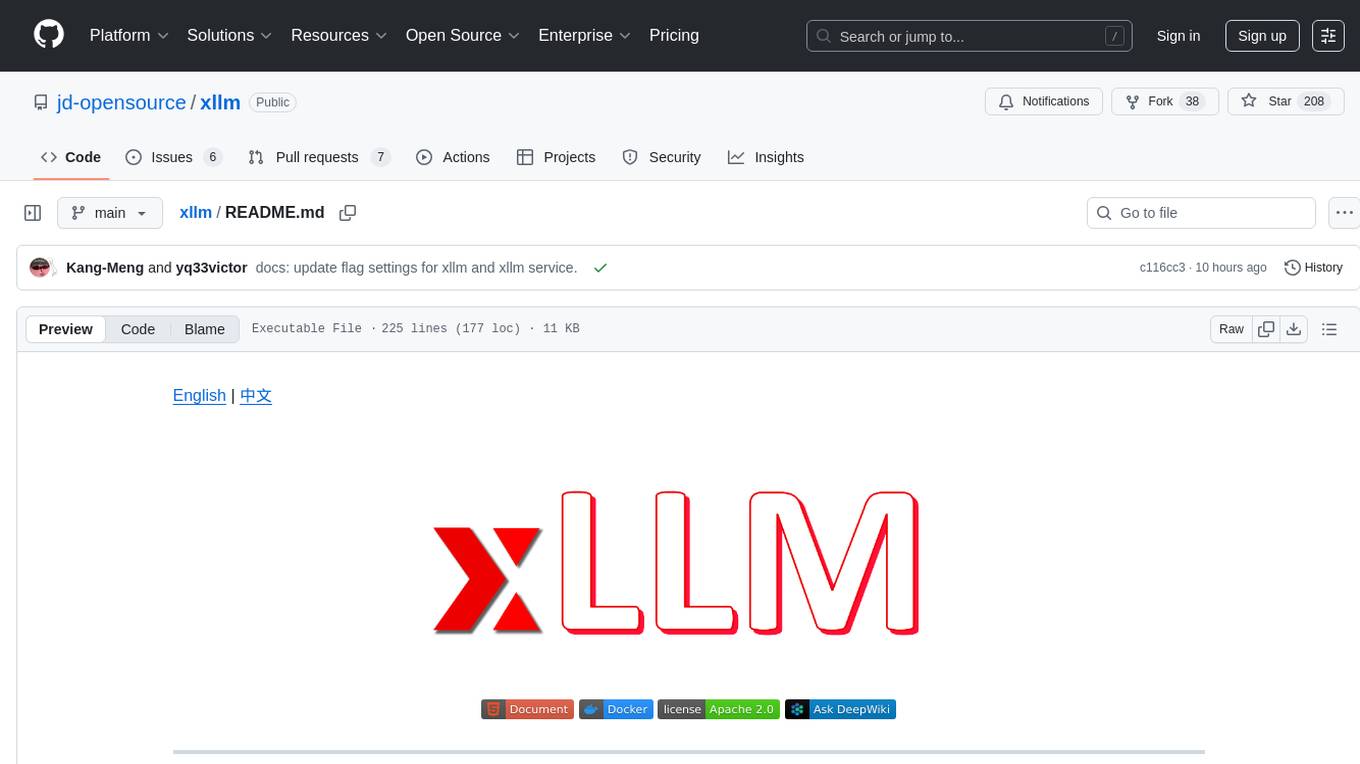
xLLM is an efficient LLM inference framework optimized for Chinese AI accelerators, enabling enterprise-grade deployment with enhanced efficiency and reduced cost. It adopts a service-engine decoupled inference architecture, achieving breakthrough efficiency through technologies like elastic scheduling, dynamic PD disaggregation, multi-stream parallel computing, graph fusion optimization, and global KV cache management. xLLM supports deployment of mainstream large models on Chinese AI accelerators, empowering enterprises in scenarios like intelligent customer service, risk control, supply chain optimization, ad recommendation, and more.
README:
| Documentation | Technical Report |
- 2026-02-12: 🎉 We day-0 support high-performance inference for the GLM-5 model, please refer to the Deployment Document for deployment.
- 2025-12-21: 🎉 We day-0 support high-performance inference for the GLM-4.7 model.
- 2025-12-08: 🎉 We day-0 support high-performance inference for the GLM-4.6V model.
- 2025-12-05: 🎉 We now support high-performance inference for the GLM-4.5/GLM-4.6 series models.
- 2025-12-05: 🎉 We now support high-performance inference for the VLM-R1 model.
- 2025-12-05: 🎉 We build hybrid KV cache management based on Mooncake, supporting global KV cache management with intelligent offloading and prefetching.
- 2025-10-16: 🎉 We recently have released our xLLM Technical Report on arXiv, providing comprehensive technical blueprints and implementation insights.
xLLM is an efficient LLM inference framework, specifically optimized for Chinese AI accelerators, enabling enterprise-grade deployment with enhanced efficiency and reduced cost. The framework adopts a service-engine decoupled inference architecture, achieving breakthrough efficiency through several technologies: at the service layer, including elastic scheduling of online/offline requests, dynamic PD disaggregation, a hybrid EPD mechanism for multimodal and high-availability fault tolerance; and at the engine layer, combined with technologies such as multi-stream parallel computing, graph fusion optimization, speculative inference, dynamic load balancing and global KV cache management. The overall architecture is shown below:
xLLM already supports efficient deployment of mainstream large models (such as DeepSeek-V3.1, Qwen2/3, etc.) on Chinese AI accelerators, empowering enterprises to implement high-performance, low-cost AI large model applications. xLLM has been fully deployed in JD.com’s real core retail businesses, covering a variety of scenarios including intelligent customer service, risk control, supply chain optimization, ad recommendation, and more.
xLLM delivers robust intelligent computing capabilities. By leveraging hardware system optimization and algorithm-driven decision control, it jointly accelerates the inference process, enabling high-throughput, low-latency distributed inference services.
Full Graph Pipeline Execution Orchestration
- Asynchronous decoupled scheduling at the requests scheduling layer, to reduce computational bubbles.
- Asynchronous parallelism of computation and communication at the model graph layer, overlapping computation and communication.
- Pipelining of heterogeneous computing units at the operator kernel layer, overlapping computation and memory access.
Graph Optimization for Dynamic Shapes
- Dynamic shape adaptation based on parameterization and multi-graph caching methods to enhance the flexibility of static graph.
- Controlled tensor memory pool to ensure address security and reusability.
- Integration and adaptation of performance-critical custom operators (e.g., PageAttention, AllReduce).
Efficient Memory Optimization
- Mapping management between discrete physical memory and continuous virtual memory.
- On-demand memory allocation to reduce memory fragmentation.
- Intelligent scheduling of memory pages to increase memory reusability.
- Adaptation of corresponding operators for domestic accelerators.
Global KV Cache Management
- Intelligent offloading and prefetching of KV in hierarchical caches.
- KV cache-centric distributed storage architecture.
- Intelligent KV routing among computing nodes.
Algorithm-driven Acceleration
- Speculative decoding optimization to improve efficiency through multi-core parallelism.
- Dynamic load balancing of MoE experts to achieve efficient adjustment of expert distribution.
| Hardware | Example | Remark |
|---|---|---|
| NPU | A2, A3 | HDK Driver 25.2.0 + |
| MLU | MLU590 | |
| ILU | BI150 | |
| MUSA | S5000 |
Besides, please check the supported models on different hardwares at Supported Models List.
Please refer to Quick Start for more details.
There are several ways you can contribute to xLLM:
- Reporting Issues (Bugs & Errors)
- Suggesting Enhancements
- Improving Documentation
- Fork the repository
- Add your view in document
- Send your pull request
- Writing Code
- Fork the repository
- Create a new branch
- Add your feature or improvement
- Send your pull request
We appreciate all kinds of contributions! 🎉🎉🎉 If you have problems about development, please check our document: Document
If you encounter any issues along the way, you are welcomed to submit reproducible steps and log snippets in the project's Issues area, or contact the xLLM Core team directly via your internal Slack. In addition, we have established official WeChat groups. You can access the following QR code to join. Welcome to contact us!
This project was made possible thanks to the following open-source projects:
- ScaleLLM - xLLM draws inspiration from ScaleLLM's graph construction method and references its runtime execution.
- Mooncake - Build xLLM hybrid KV cache management based on Mooncake.
- brpc - Build high-performance http service based on brpc.
- tokenizers-cpp - Build C++ tokenizer based on tokenizers-cpp.
- safetensors - xLLM relies on the C binding safetensors capability.
- Partial JSON Parser - Implement xLLM's C++ JSON parser with insights from Python and Go implementations.
- concurrentqueue - A fast multi-producer, multi-consumer lock-free concurrent queue for C++11.
Thanks to the following collaborating university laboratories:
- THU-MIG (School of Software, BNRist, Tsinghua University)
- USTC-Cloudlab (Cloud Computing Lab, University of Science and Technology of China)
- Beihang-HiPO (Beihang HiPO research group)
- PKU-DS-LAB (Data Structure Laboratory, Peking University)
- PKU-NetSys-LAB (NetSys Lab, Peking University)
Thanks to all the following developers who have contributed to xLLM.
If you think this repository is helpful to you, welcome to cite us:
@article{liu2025xllm,
title={xLLM Technical Report},
author={Liu, Tongxuan and Peng, Tao and Yang, Peijun and Zhao, Xiaoyang and Lu, Xiusheng and Huang, Weizhe and Liu, Zirui and Chen, Xiaoyu and Liang, Zhiwei and Xiong, Jun and others},
journal={arXiv preprint arXiv:2510.14686},
year={2025}
}
For Tasks:
Click tags to check more tools for each tasksFor Jobs:
Alternative AI tools for xllm
Similar Open Source Tools

xllm
xLLM is an efficient LLM inference framework optimized for Chinese AI accelerators, enabling enterprise-grade deployment with enhanced efficiency and reduced cost. It adopts a service-engine decoupled inference architecture, achieving breakthrough efficiency through technologies like elastic scheduling, dynamic PD disaggregation, multi-stream parallel computing, graph fusion optimization, and global KV cache management. xLLM supports deployment of mainstream large models on Chinese AI accelerators, empowering enterprises in scenarios like intelligent customer service, risk control, supply chain optimization, ad recommendation, and more.
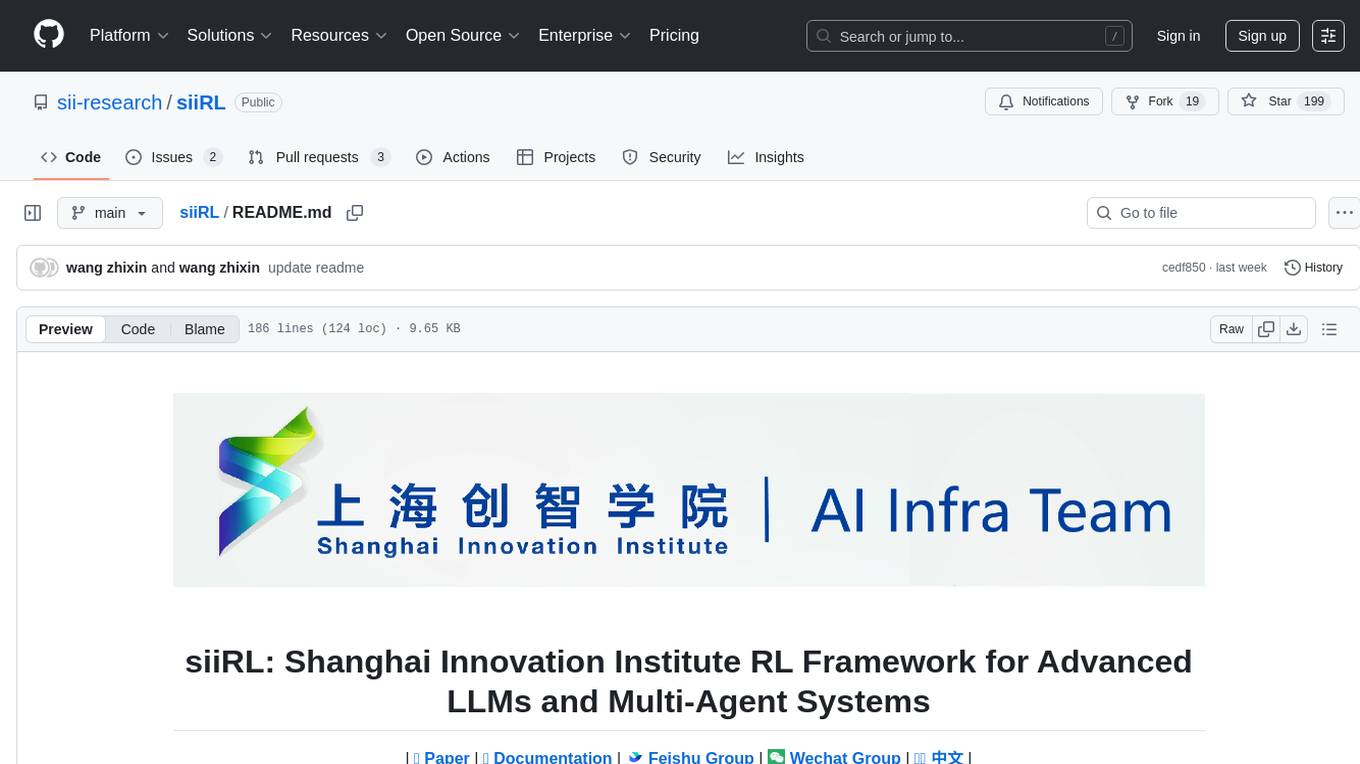
siiRL
siiRL is a novel, fully distributed reinforcement learning (RL) framework designed to break the scaling barriers in Large Language Models (LLMs) post-training. Developed by researchers from Shanghai Innovation Institute, siiRL delivers near-linear scalability, dramatic throughput gains, and unprecedented flexibility for RL-based LLM development. It eliminates the centralized controller common in other frameworks, enabling scalability to thousands of GPUs, achieving state-of-the-art throughput, and supporting cross-hardware compatibility. siiRL is extensively benchmarked and excels in data-intensive workloads such as long-context and multi-modal training.
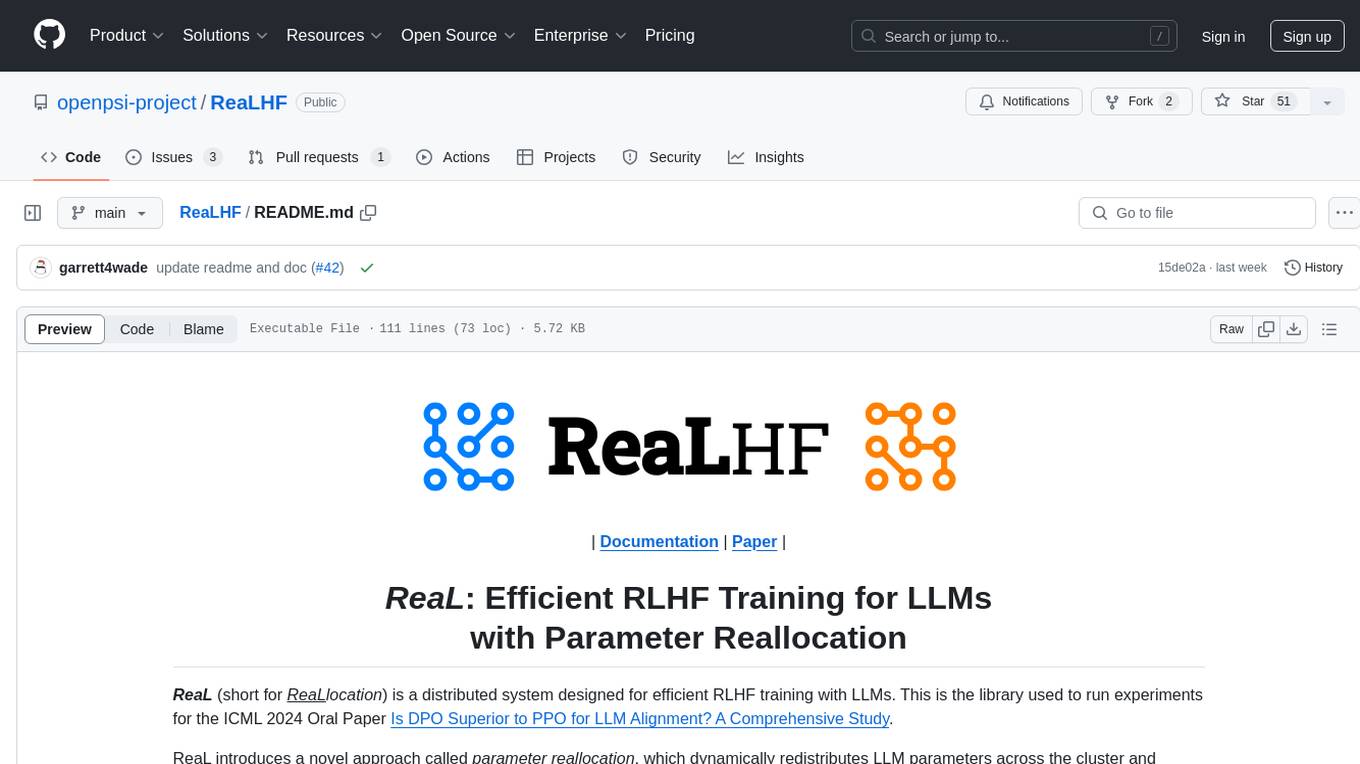
ReaLHF
ReaLHF is a distributed system designed for efficient RLHF training with Large Language Models (LLMs). It introduces a novel approach called parameter reallocation to dynamically redistribute LLM parameters across the cluster, optimizing allocations and parallelism for each computation workload. ReaL minimizes redundant communication while maximizing GPU utilization, achieving significantly higher Proximal Policy Optimization (PPO) training throughput compared to other systems. It supports large-scale training with various parallelism strategies and enables memory-efficient training with parameter and optimizer offloading. The system seamlessly integrates with HuggingFace checkpoints and inference frameworks, allowing for easy launching of local or distributed experiments. ReaLHF offers flexibility through versatile configuration customization and supports various RLHF algorithms, including DPO, PPO, RAFT, and more, while allowing the addition of custom algorithms for high efficiency.
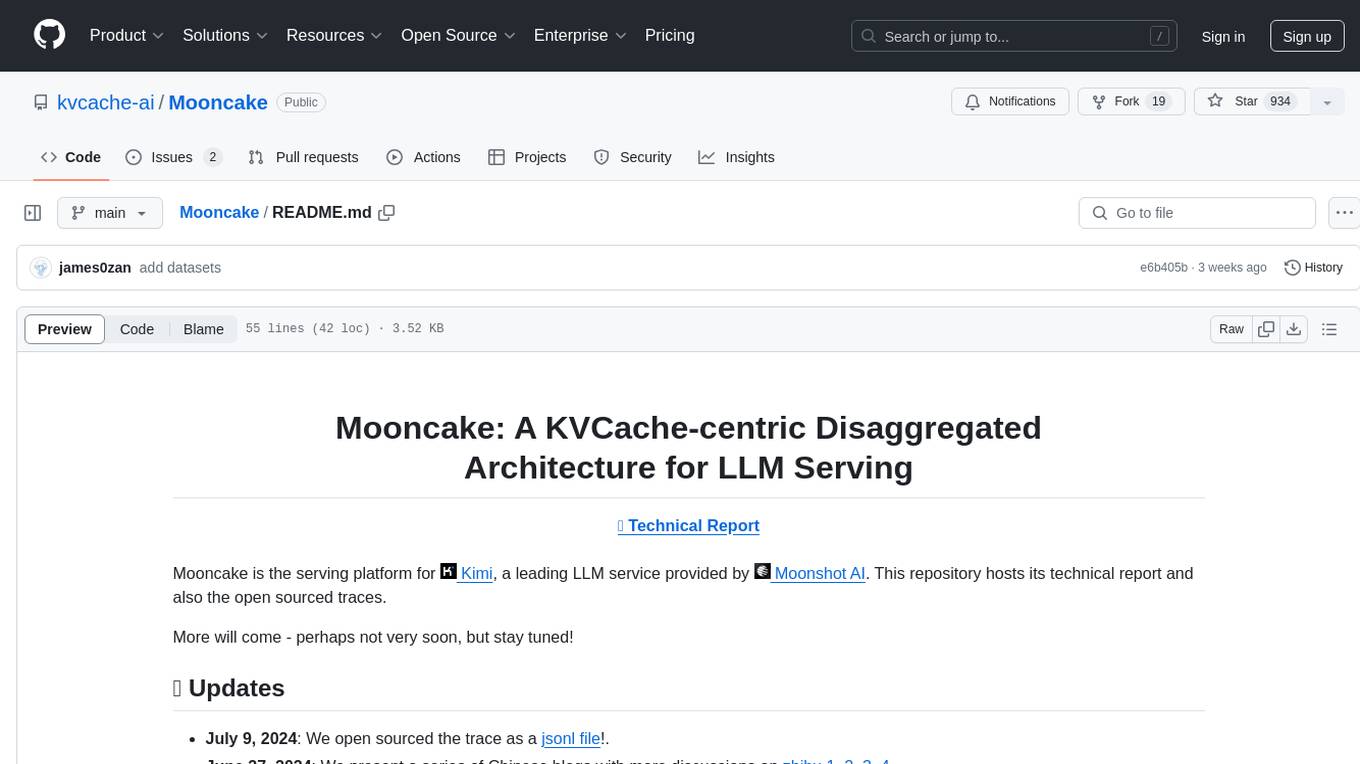
Mooncake
Mooncake is a serving platform for Kimi, a leading LLM service provided by Moonshot AI. It features a KVCache-centric disaggregated architecture that separates prefill and decoding clusters, leveraging underutilized CPU, DRAM, and SSD resources of the GPU cluster. Mooncake's scheduler balances throughput and latency-related SLOs, with a prediction-based early rejection policy for highly overloaded scenarios. It excels in long-context scenarios, achieving up to a 525% increase in throughput while handling 75% more requests under real workloads.
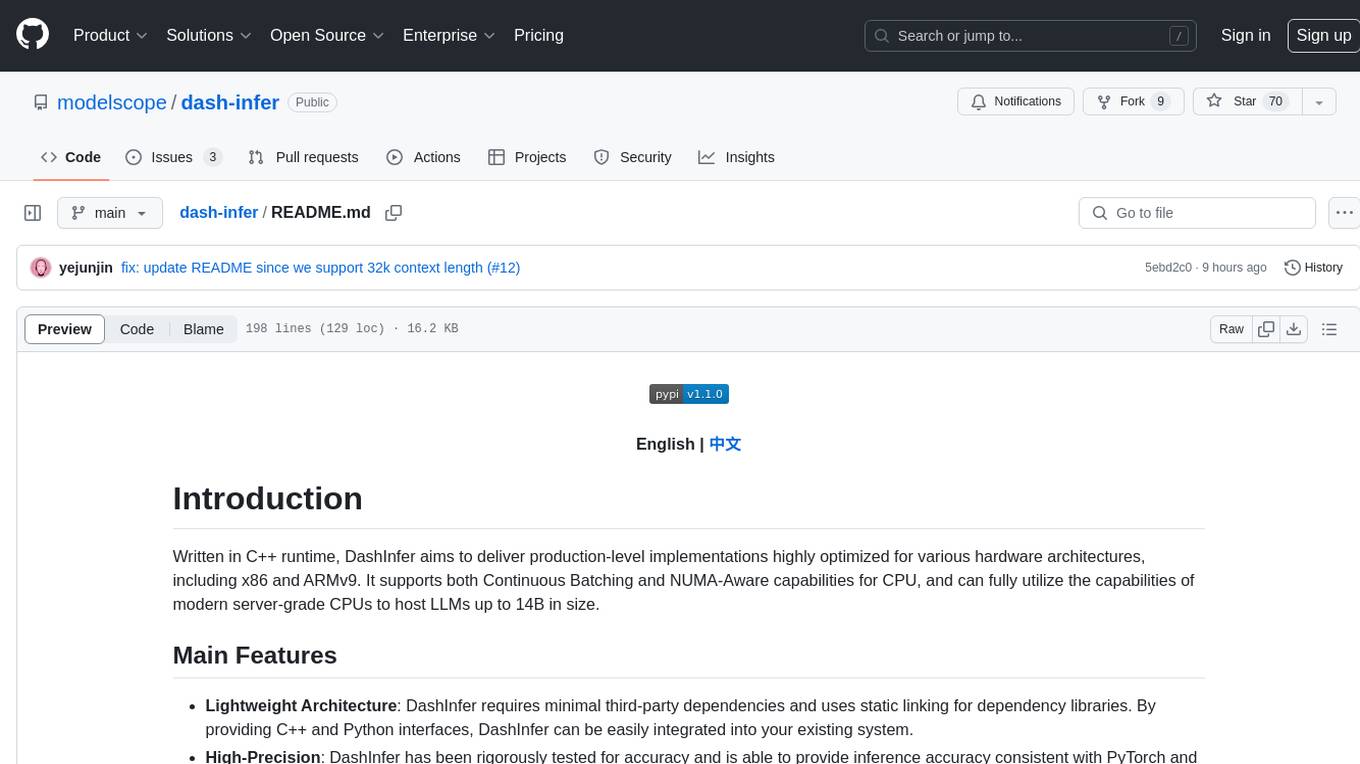
dash-infer
DashInfer is a C++ runtime tool designed to deliver production-level implementations highly optimized for various hardware architectures, including x86 and ARMv9. It supports Continuous Batching and NUMA-Aware capabilities for CPU, and can fully utilize modern server-grade CPUs to host large language models (LLMs) up to 14B in size. With lightweight architecture, high precision, support for mainstream open-source LLMs, post-training quantization, optimized computation kernels, NUMA-aware design, and multi-language API interfaces, DashInfer provides a versatile solution for efficient inference tasks. It supports x86 CPUs with AVX2 instruction set and ARMv9 CPUs with SVE instruction set, along with various data types like FP32, BF16, and InstantQuant. DashInfer also offers single-NUMA and multi-NUMA architectures for model inference, with detailed performance tests and inference accuracy evaluations available. The tool is supported on mainstream Linux server operating systems and provides documentation and examples for easy integration and usage.
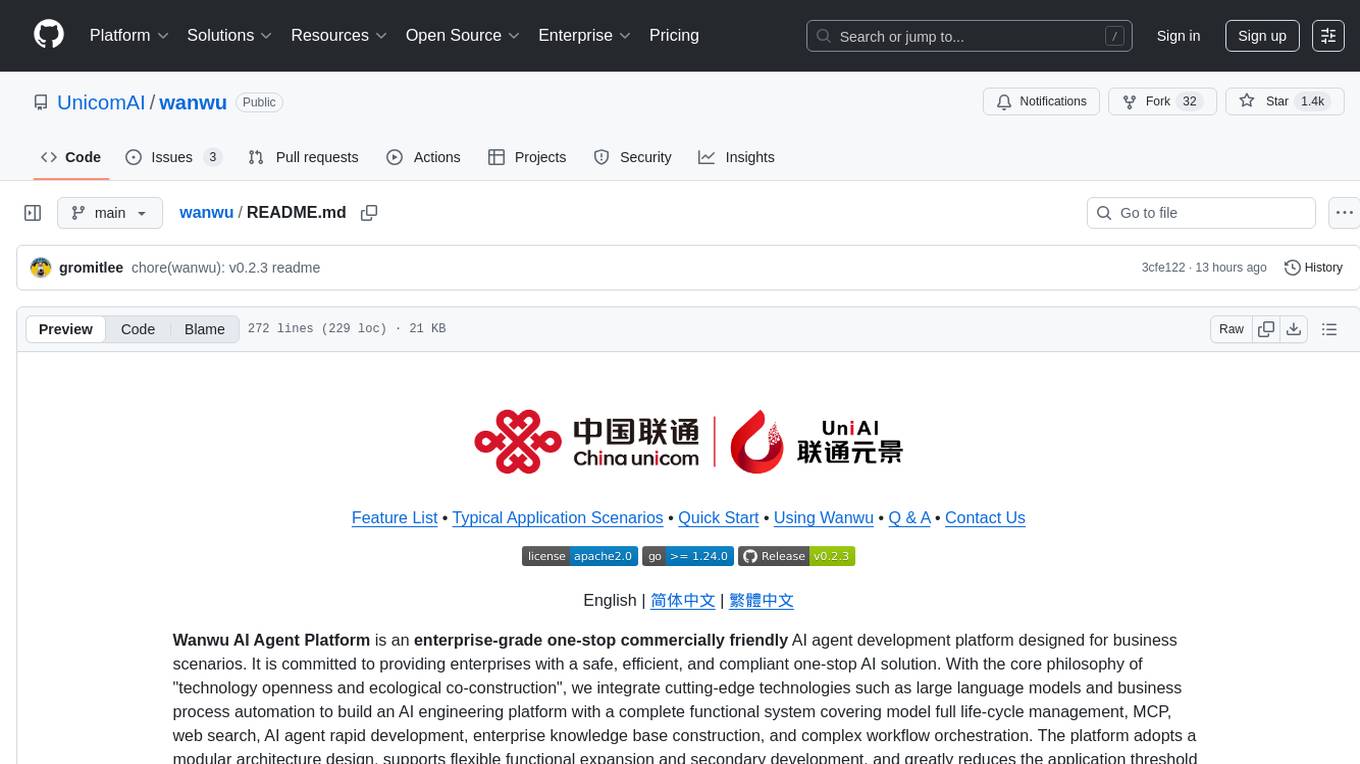
wanwu
Wanwu AI Agent Platform is an enterprise-grade one-stop commercially friendly AI agent development platform designed for business scenarios. It provides enterprises with a safe, efficient, and compliant one-stop AI solution. The platform integrates cutting-edge technologies such as large language models and business process automation to build an AI engineering platform covering model full life-cycle management, MCP, web search, AI agent rapid development, enterprise knowledge base construction, and complex workflow orchestration. It supports modular architecture design, flexible functional expansion, and secondary development, reducing the application threshold of AI technology while ensuring security and privacy protection of enterprise data. It accelerates digital transformation, cost reduction, efficiency improvement, and business innovation for enterprises of all sizes.
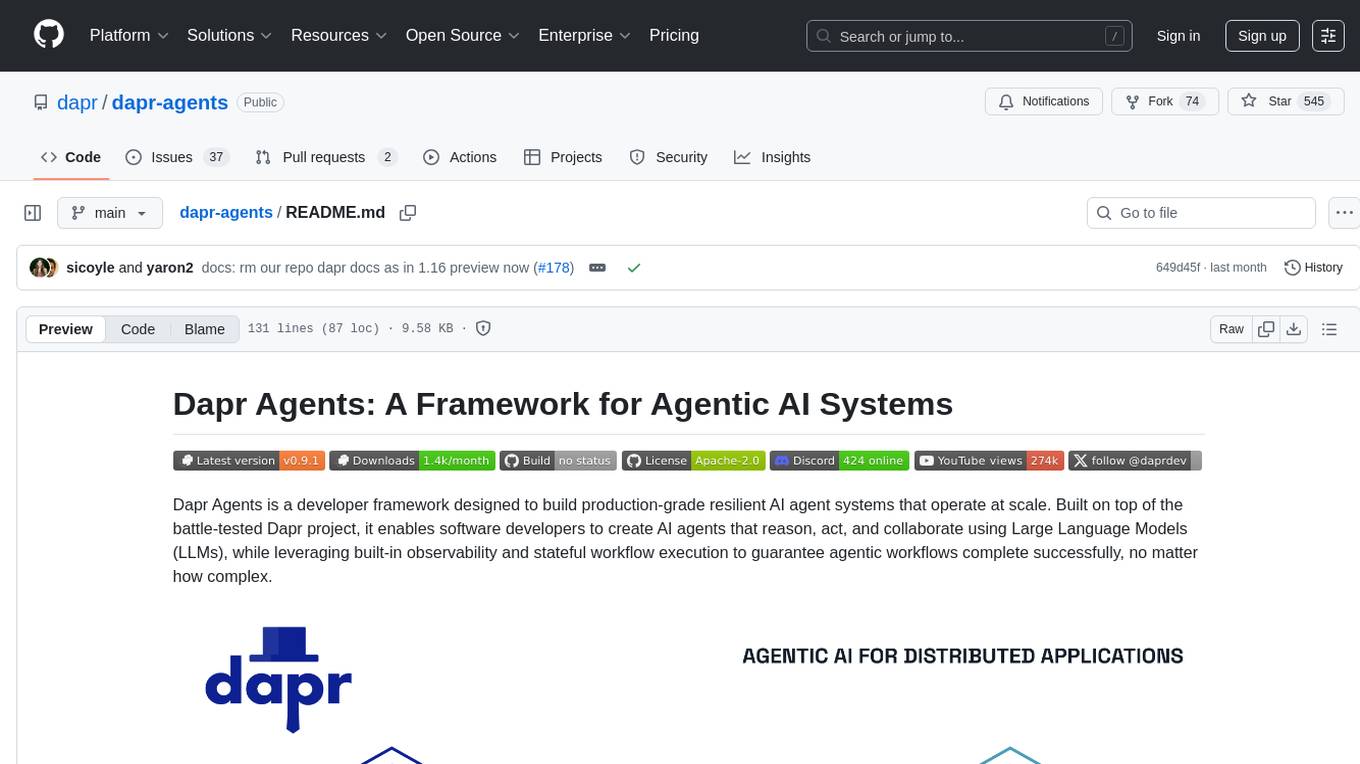
dapr-agents
Dapr Agents is a developer framework for building production-grade resilient AI agent systems that operate at scale. It enables software developers to create AI agents that reason, act, and collaborate using Large Language Models (LLMs), while providing built-in observability and stateful workflow execution to ensure agentic workflows complete successfully. The framework is scalable, efficient, Kubernetes-native, data-driven, secure, observable, vendor-neutral, and open source. It offers features like scalable workflows, cost-effective AI adoption, data-centric AI agents, accelerated development, integrated security and reliability, built-in messaging and state infrastructure, and vendor-neutral and open source support. Dapr Agents is designed to simplify the development of AI applications and workflows by providing a comprehensive API surface and seamless integration with various data sources and services.
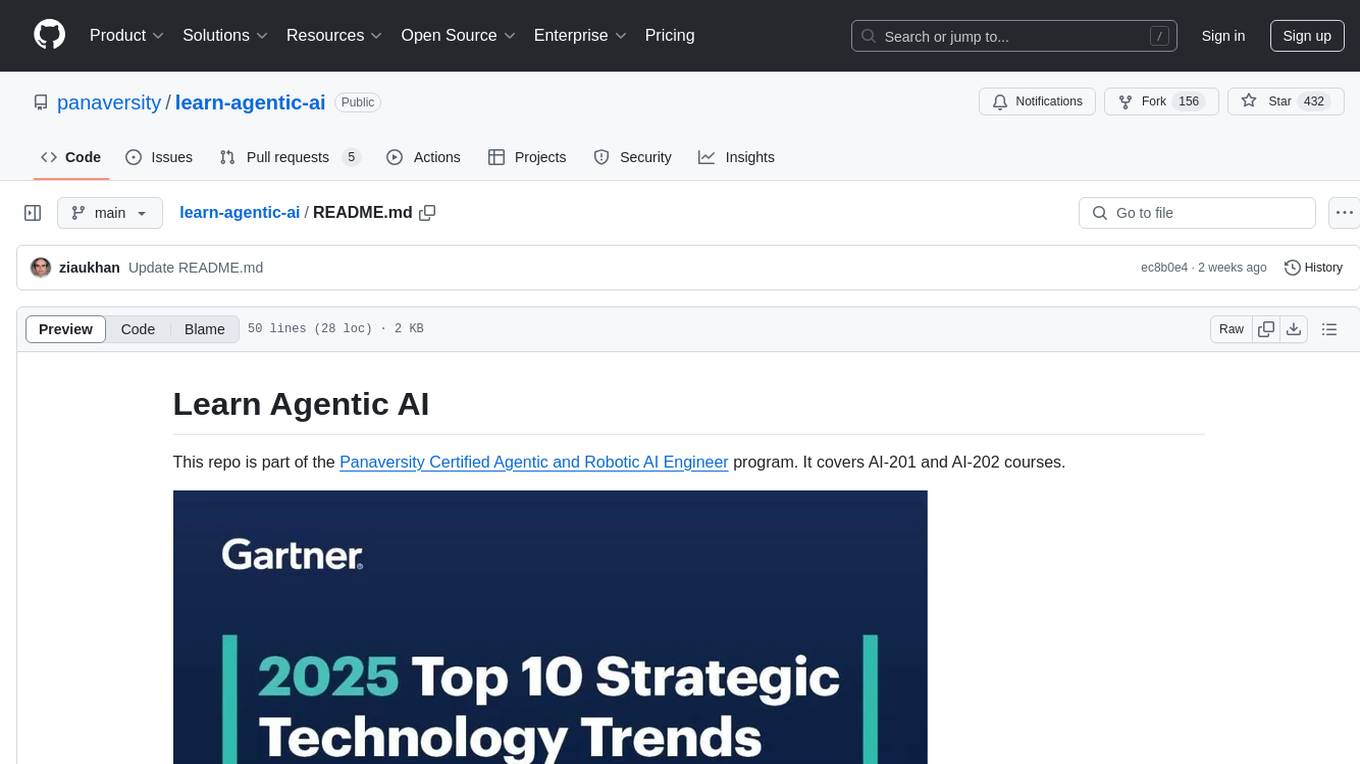
learn-agentic-ai
Learn Agentic AI is a repository that is part of the Panaversity Certified Agentic and Robotic AI Engineer program. It covers AI-201 and AI-202 courses, providing fundamentals and advanced knowledge in Agentic AI. The repository includes video playlists, projects, and project submission guidelines for students to enhance their understanding and skills in the field of AI engineering.

openvino
OpenVINO™ is an open-source toolkit for optimizing and deploying AI inference. It provides a common API to deliver inference solutions on various platforms, including CPU, GPU, NPU, and heterogeneous devices. OpenVINO™ supports pre-trained models from Open Model Zoo and popular frameworks like TensorFlow, PyTorch, and ONNX. Key components of OpenVINO™ include the OpenVINO™ Runtime, plugins for different hardware devices, frontends for reading models from native framework formats, and the OpenVINO Model Converter (OVC) for adjusting models for optimal execution on target devices.
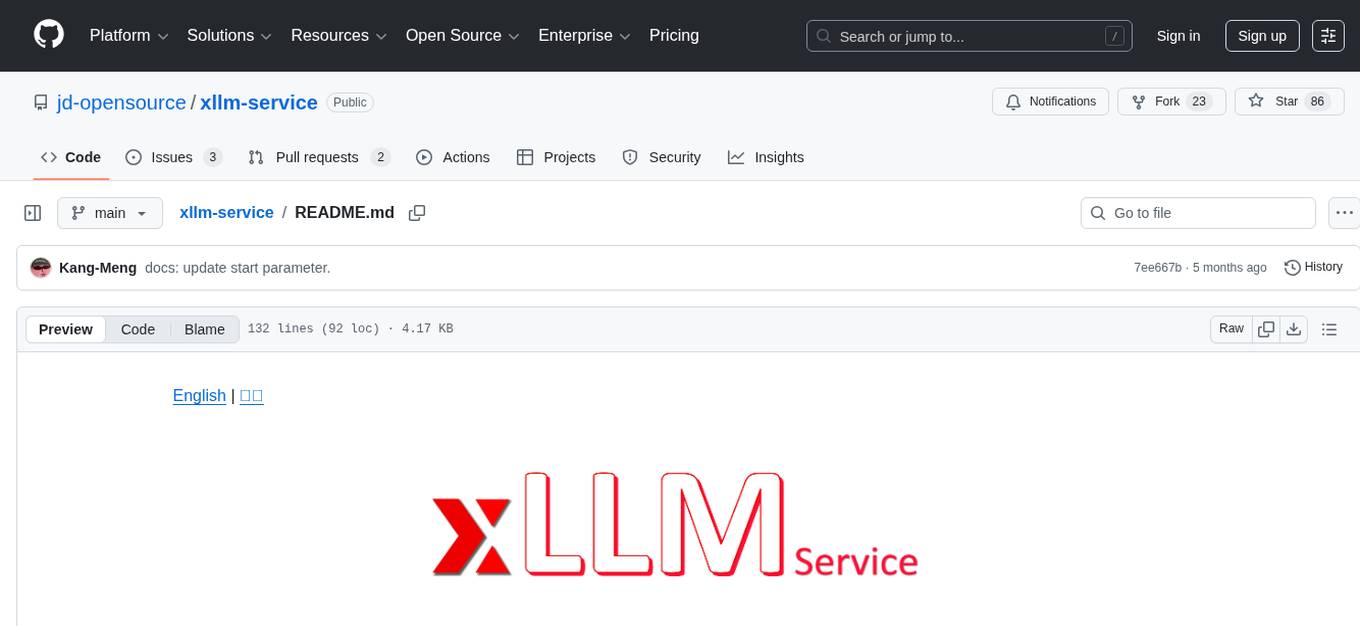
xllm-service
xLLM-service is a service-layer framework developed based on the xLLM inference engine, providing efficient, fault-tolerant, and flexible LLM inference services for clustered deployment. It addresses challenges in enterprise-level service scenarios such as ensuring SLA of online services, improving resource utilization, reacting to changing request loads, resolving performance bottlenecks, and ensuring high reliability of computing instances. With features like unified scheduling, adaptive dynamic allocation, EPD three-stage disaggregation, and fault-tolerant architecture, xLLM-service offers efficient and reliable LLM inference services.
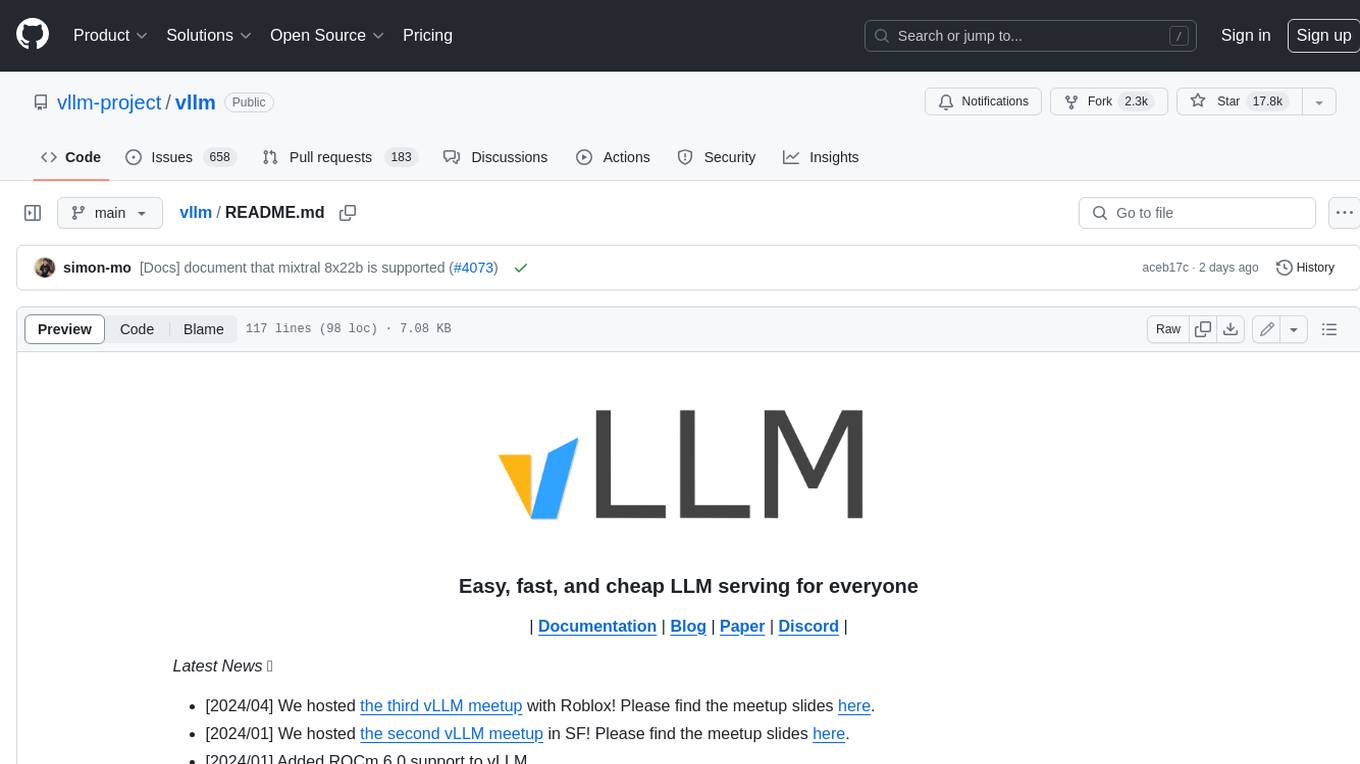
vllm
vLLM is a fast and easy-to-use library for LLM inference and serving. It is designed to be efficient, flexible, and easy to use. vLLM can be used to serve a variety of LLM models, including Hugging Face models. It supports a variety of decoding algorithms, including parallel sampling, beam search, and more. vLLM also supports tensor parallelism for distributed inference and streaming outputs. It is open-source and available on GitHub.
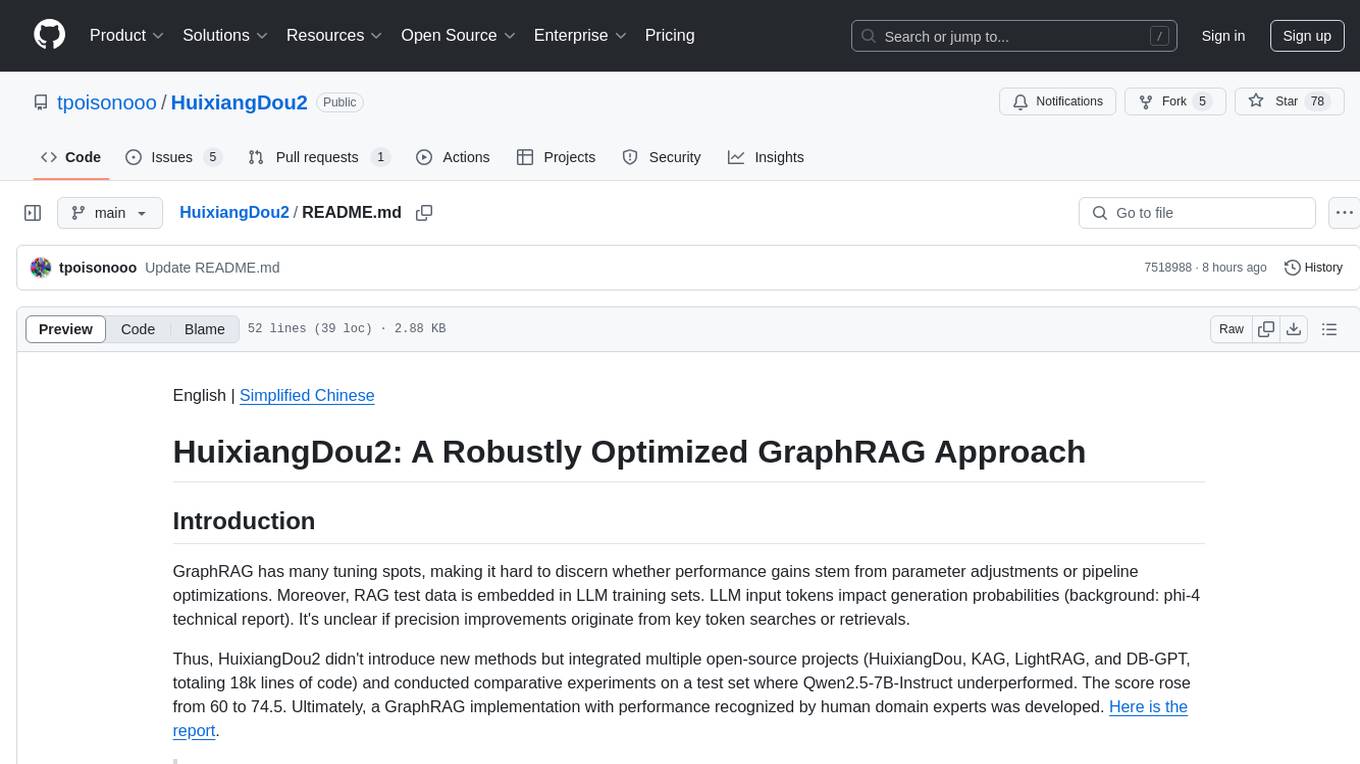
HuixiangDou2
HuixiangDou2 is a robustly optimized GraphRAG approach that integrates multiple open-source projects to improve performance in graph-based augmented generation. It conducts comparative experiments and achieves a significant score increase, leading to a GraphRAG implementation with recognized performance. The repository provides code improvements, dense retrieval for querying entities and relationships, real domain knowledge testing, and impact analysis on accuracy.
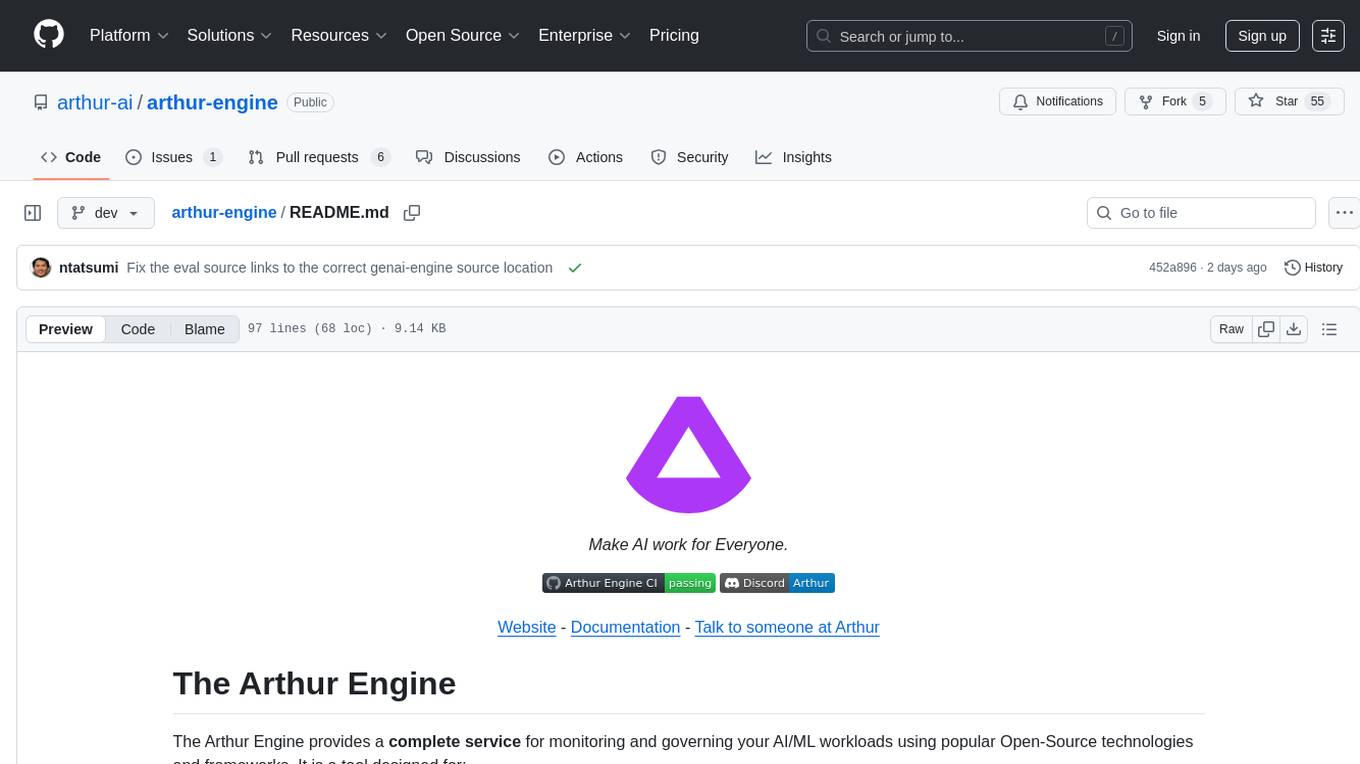
arthur-engine
The Arthur Engine is a comprehensive tool for monitoring and governing AI/ML workloads. It provides evaluation and benchmarking of machine learning models, guardrails enforcement, and extensibility for fitting into various application architectures. With support for a wide range of evaluation metrics and customizable features, the tool aims to improve model understanding, optimize generative AI outputs, and prevent data-security and compliance risks. Key features include real-time guardrails, model performance monitoring, feature importance visualization, error breakdowns, and support for custom metrics and models integration.
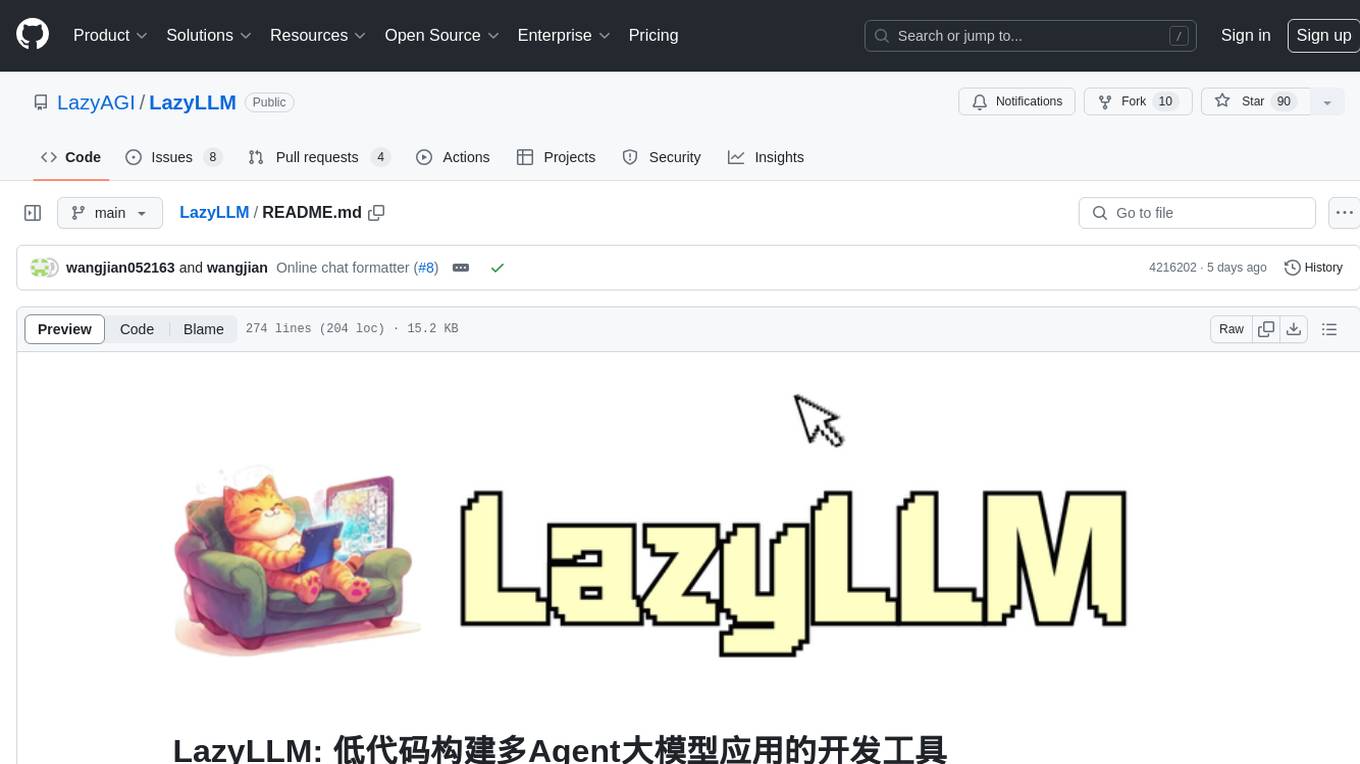
LazyLLM
LazyLLM is a low-code development tool for building complex AI applications with multiple agents. It assists developers in building AI applications at a low cost and continuously optimizing their performance. The tool provides a convenient workflow for application development and offers standard processes and tools for various stages of application development. Users can quickly prototype applications with LazyLLM, analyze bad cases with scenario task data, and iteratively optimize key components to enhance the overall application performance. LazyLLM aims to simplify the AI application development process and provide flexibility for both beginners and experts to create high-quality applications.
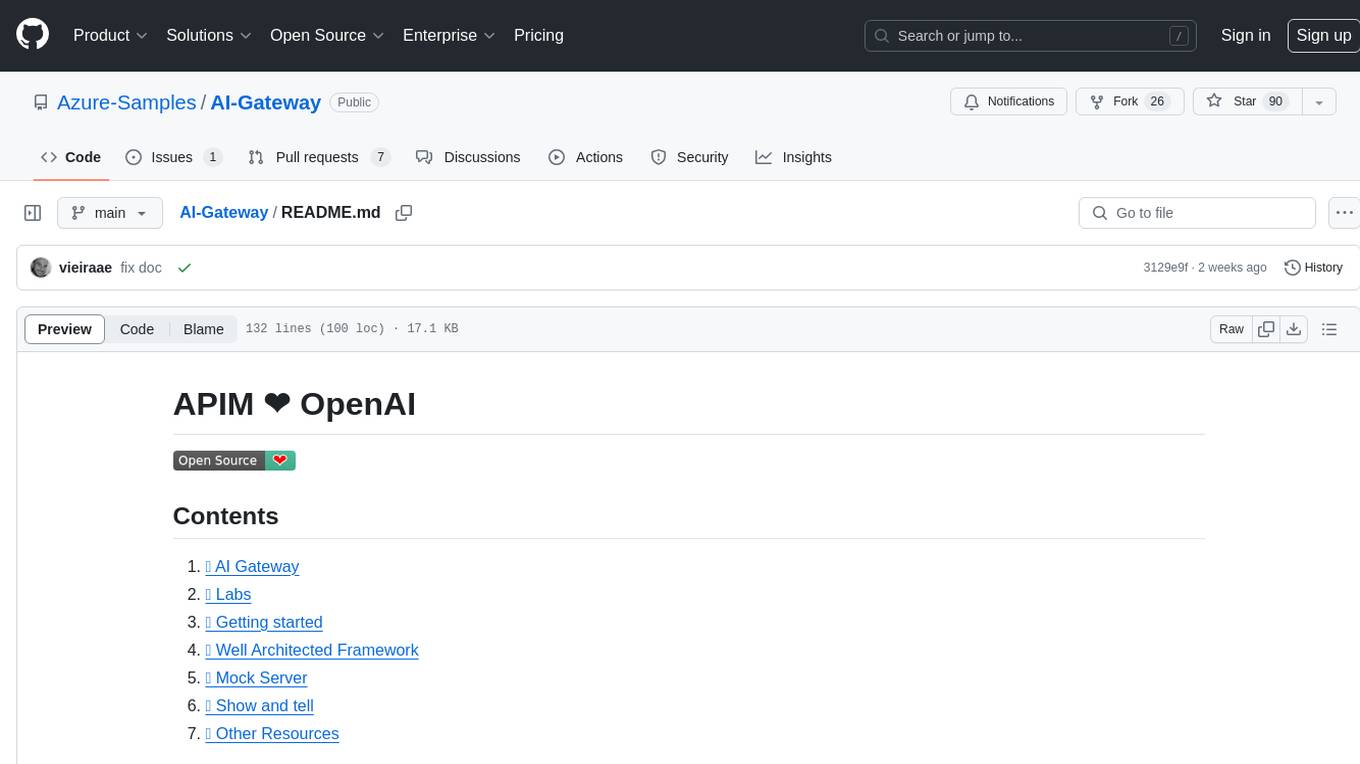
AI-Gateway
The AI-Gateway repository explores the AI Gateway pattern through a series of experimental labs, focusing on Azure API Management for handling AI services APIs. The labs provide step-by-step instructions using Jupyter notebooks with Python scripts, Bicep files, and APIM policies. The goal is to accelerate experimentation of advanced use cases and pave the way for further innovation in the rapidly evolving field of AI. The repository also includes a Mock Server to mimic the behavior of the OpenAI API for testing and development purposes.
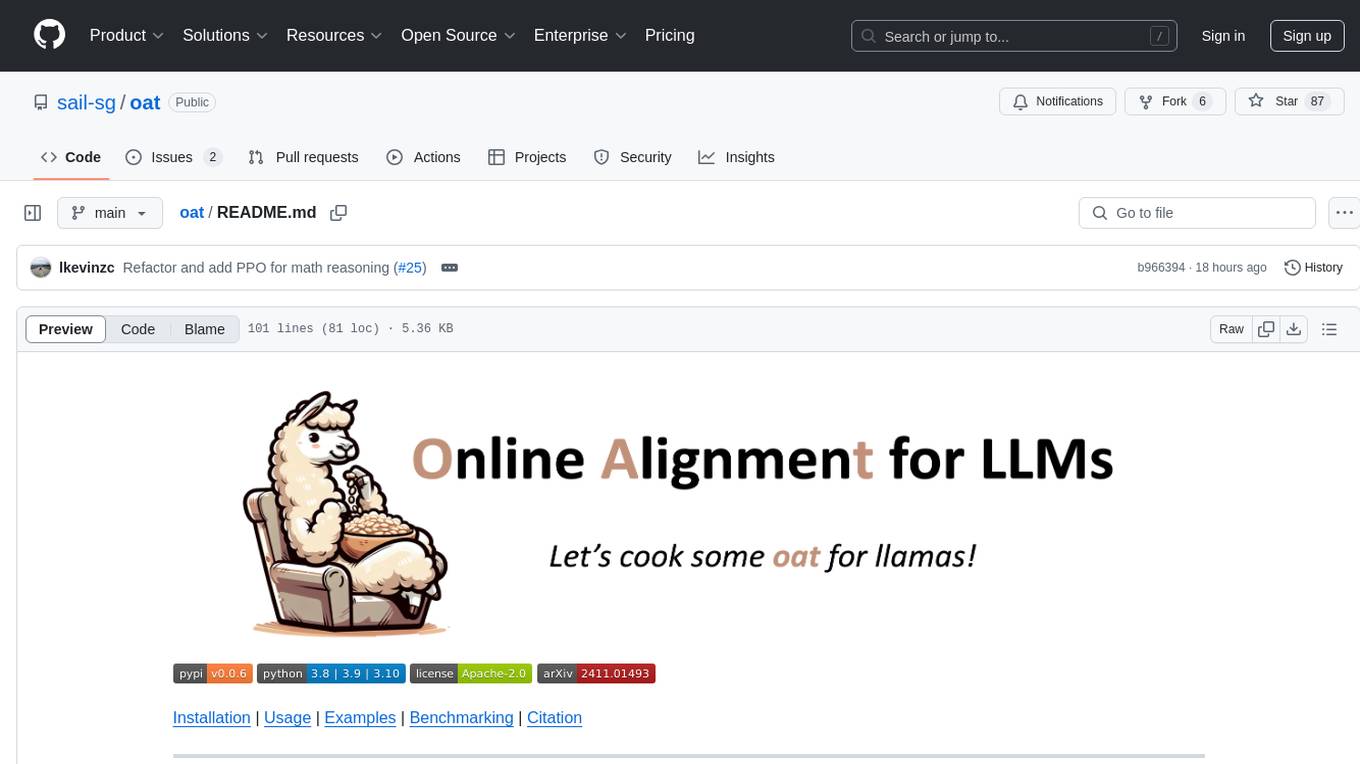
oat
Oat is a simple and efficient framework for running online LLM alignment algorithms. It implements a distributed Actor-Learner-Oracle architecture, with components optimized using state-of-the-art tools. Oat simplifies the experimental pipeline of LLM alignment by serving an Oracle online for preference data labeling and model evaluation. It provides a variety of oracles for simulating feedback and supports verifiable rewards. Oat's modular structure allows for easy inheritance and modification of classes, enabling rapid prototyping and experimentation with new algorithms. The framework implements cutting-edge online algorithms like PPO for math reasoning and various online exploration algorithms.
For similar tasks

xllm
xLLM is an efficient LLM inference framework optimized for Chinese AI accelerators, enabling enterprise-grade deployment with enhanced efficiency and reduced cost. It adopts a service-engine decoupled inference architecture, achieving breakthrough efficiency through technologies like elastic scheduling, dynamic PD disaggregation, multi-stream parallel computing, graph fusion optimization, and global KV cache management. xLLM supports deployment of mainstream large models on Chinese AI accelerators, empowering enterprises in scenarios like intelligent customer service, risk control, supply chain optimization, ad recommendation, and more.
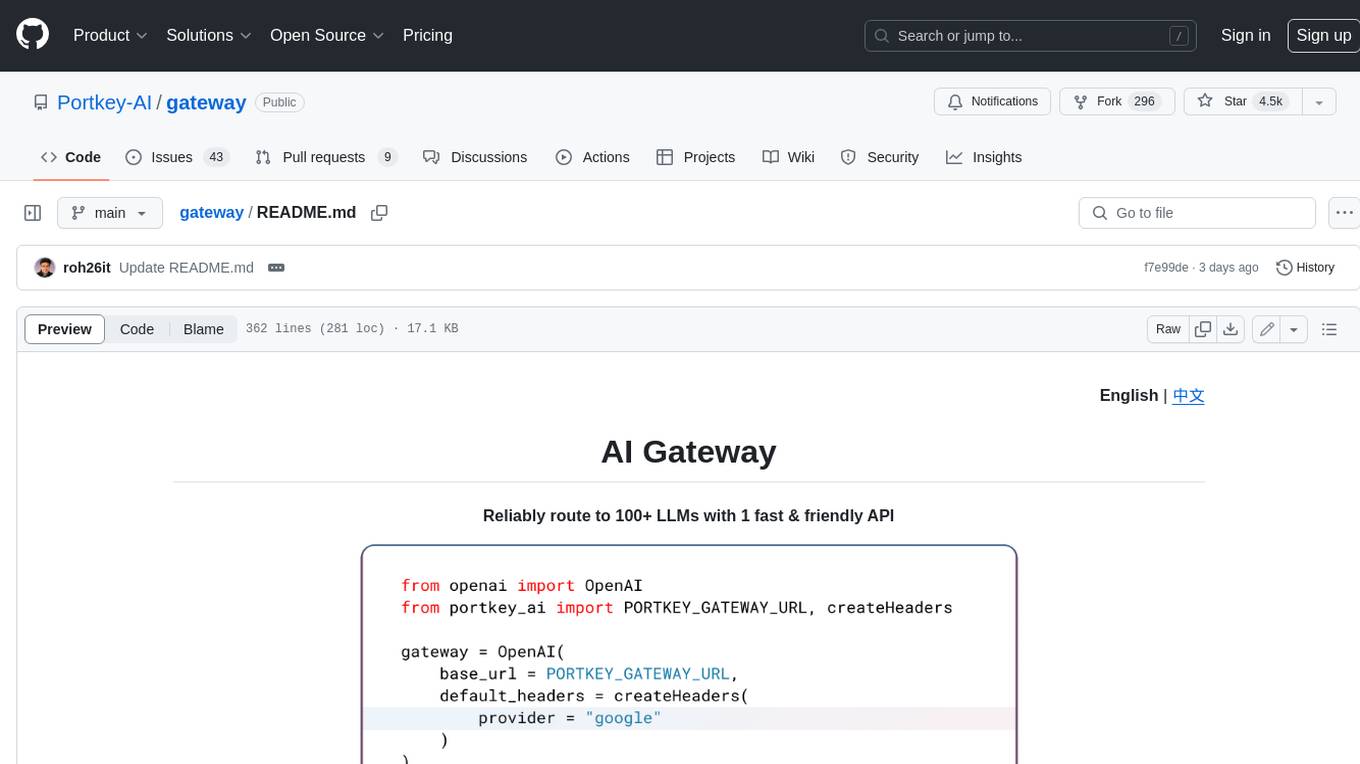
gateway
Gateway is a tool that streamlines requests to 100+ open & closed source models with a unified API. It is production-ready with support for caching, fallbacks, retries, timeouts, load balancing, and can be edge-deployed for minimum latency. It is blazing fast with a tiny footprint, supports load balancing across multiple models, providers, and keys, ensures app resilience with fallbacks, offers automatic retries with exponential fallbacks, allows configurable request timeouts, supports multimodal routing, and can be extended with plug-in middleware. It is battle-tested over 300B tokens and enterprise-ready for enhanced security, scale, and custom deployments.
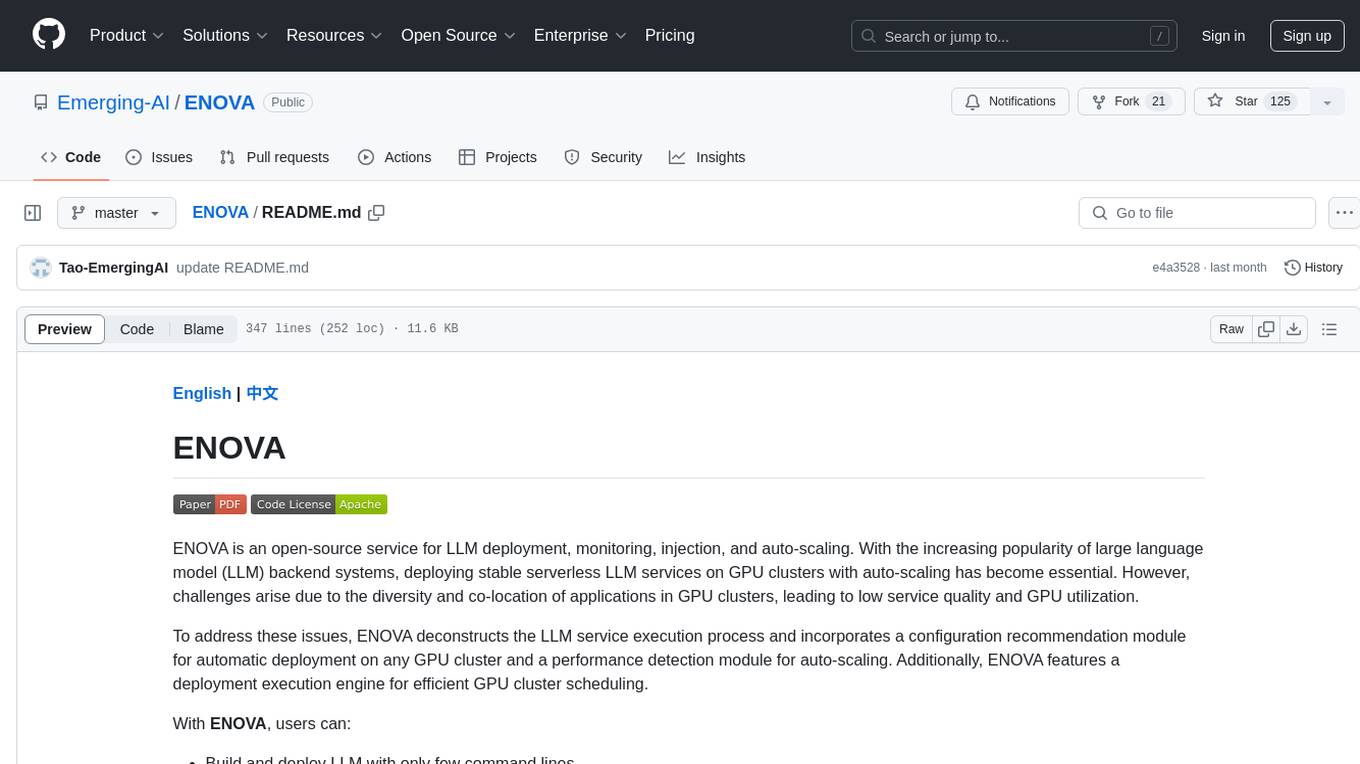
ENOVA
ENOVA is an open-source service for Large Language Model (LLM) deployment, monitoring, injection, and auto-scaling. It addresses challenges in deploying stable serverless LLM services on GPU clusters with auto-scaling by deconstructing the LLM service execution process and providing configuration recommendations and performance detection. Users can build and deploy LLM with few command lines, recommend optimal computing resources, experience LLM performance, observe operating status, achieve load balancing, and more. ENOVA ensures stable operation, cost-effectiveness, efficiency, and strong scalability of LLM services.
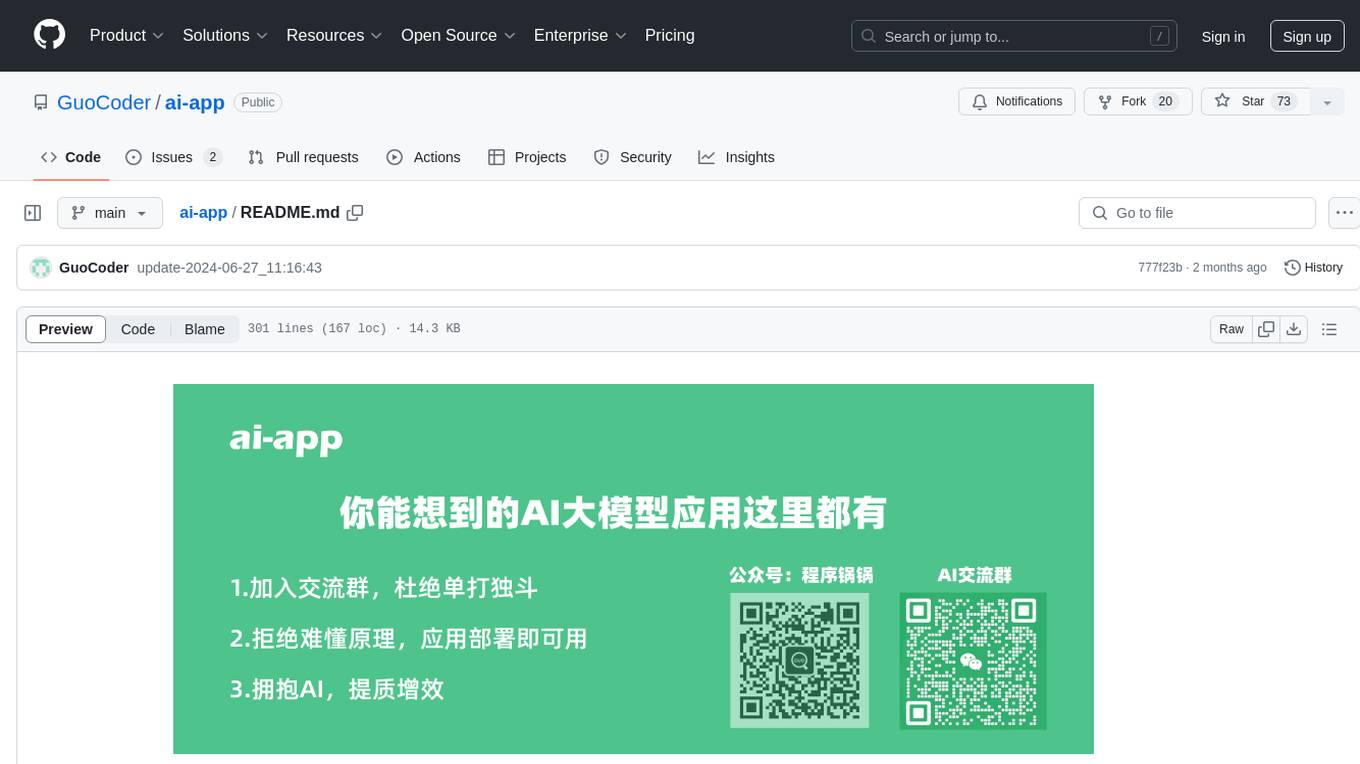
ai-app
The 'ai-app' repository is a comprehensive collection of tools and resources related to artificial intelligence, focusing on topics such as server environment setup, PyCharm and Anaconda installation, large model deployment and training, Transformer principles, RAG technology, vector databases, AI image, voice, and music generation, and AI Agent frameworks. It also includes practical guides and tutorials on implementing various AI applications. The repository serves as a valuable resource for individuals interested in exploring different aspects of AI technology.
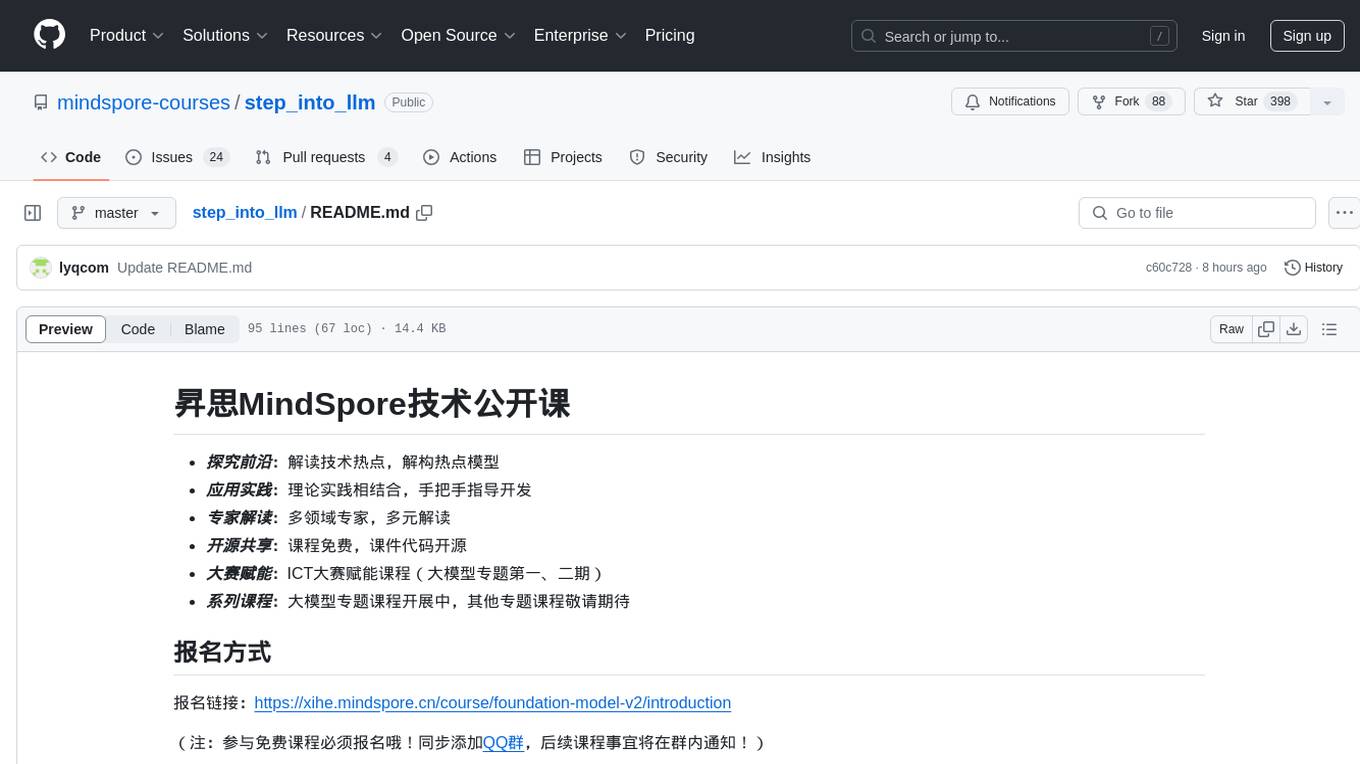
step_into_llm
The 'step_into_llm' repository is dedicated to the 昇思MindSpore technology open class, which focuses on exploring cutting-edge technologies, combining theory with practical applications, expert interpretations, open sharing, and empowering competitions. The repository contains course materials, including slides and code, for the ongoing second phase of the course. It covers various topics related to large language models (LLMs) such as Transformer, BERT, GPT, GPT2, and more. The course aims to guide developers interested in LLMs from theory to practical implementation, with a special emphasis on the development and application of large models.
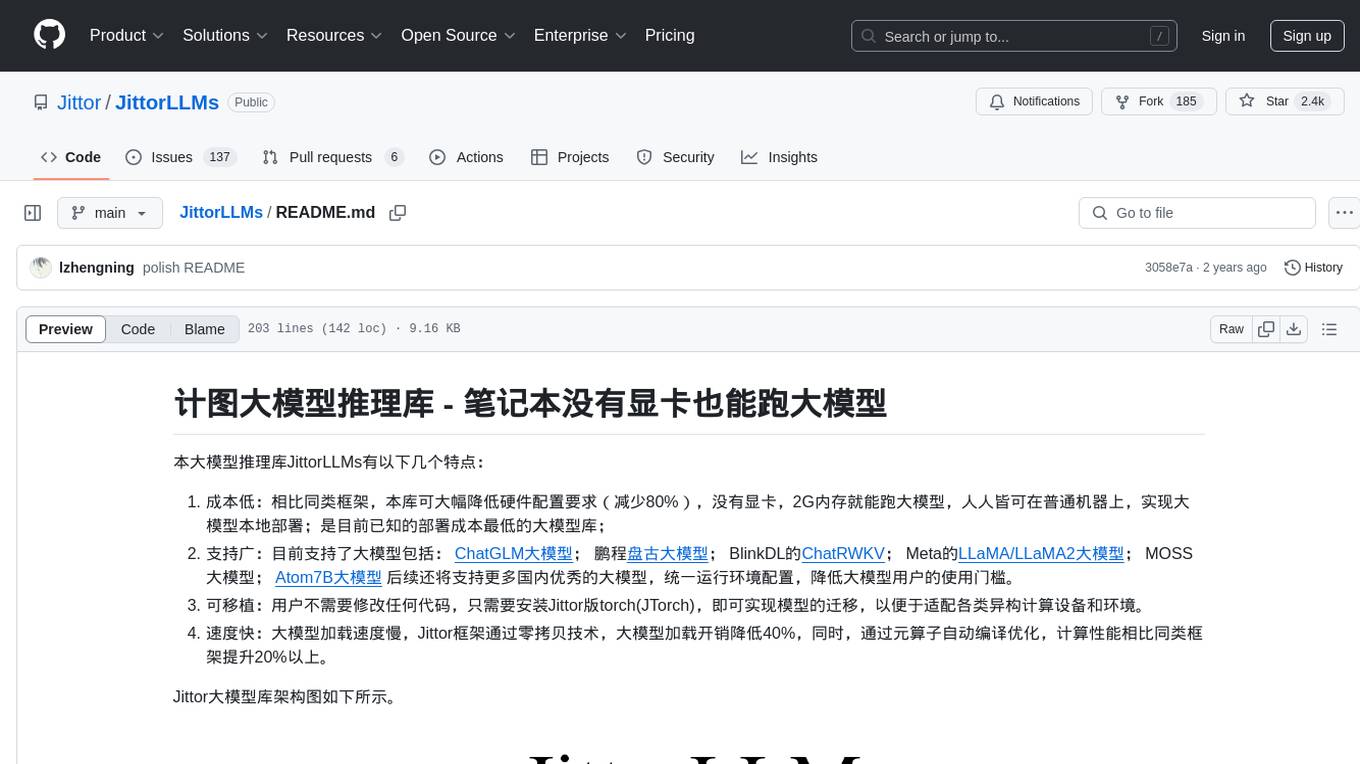
JittorLLMs
JittorLLMs is a large model inference library that allows running large models on machines with low hardware requirements. It significantly reduces hardware configuration demands, enabling deployment on ordinary machines with 2GB of memory. It supports various large models and provides a unified environment configuration for users. Users can easily migrate models without modifying any code by installing Jittor version of torch (JTorch). The framework offers fast model loading speed, optimized computation performance, and portability across different computing devices and environments.

motorhead
Motorhead is a memory and information retrieval server for LLMs. It provides three simple APIs to assist with memory handling in chat applications using LLMs. The first API, GET /sessions/:id/memory, returns messages up to a maximum window size. The second API, POST /sessions/:id/memory, allows you to send an array of messages to Motorhead for storage. The third API, DELETE /sessions/:id/memory, deletes the session's message list. Motorhead also features incremental summarization, where it processes half of the maximum window size of messages and summarizes them when the maximum is reached. Additionally, it supports searching by text query using vector search. Motorhead is configurable through environment variables, including the maximum window size, whether to enable long-term memory, the model used for incremental summarization, the server port, your OpenAI API key, and the Redis URL.
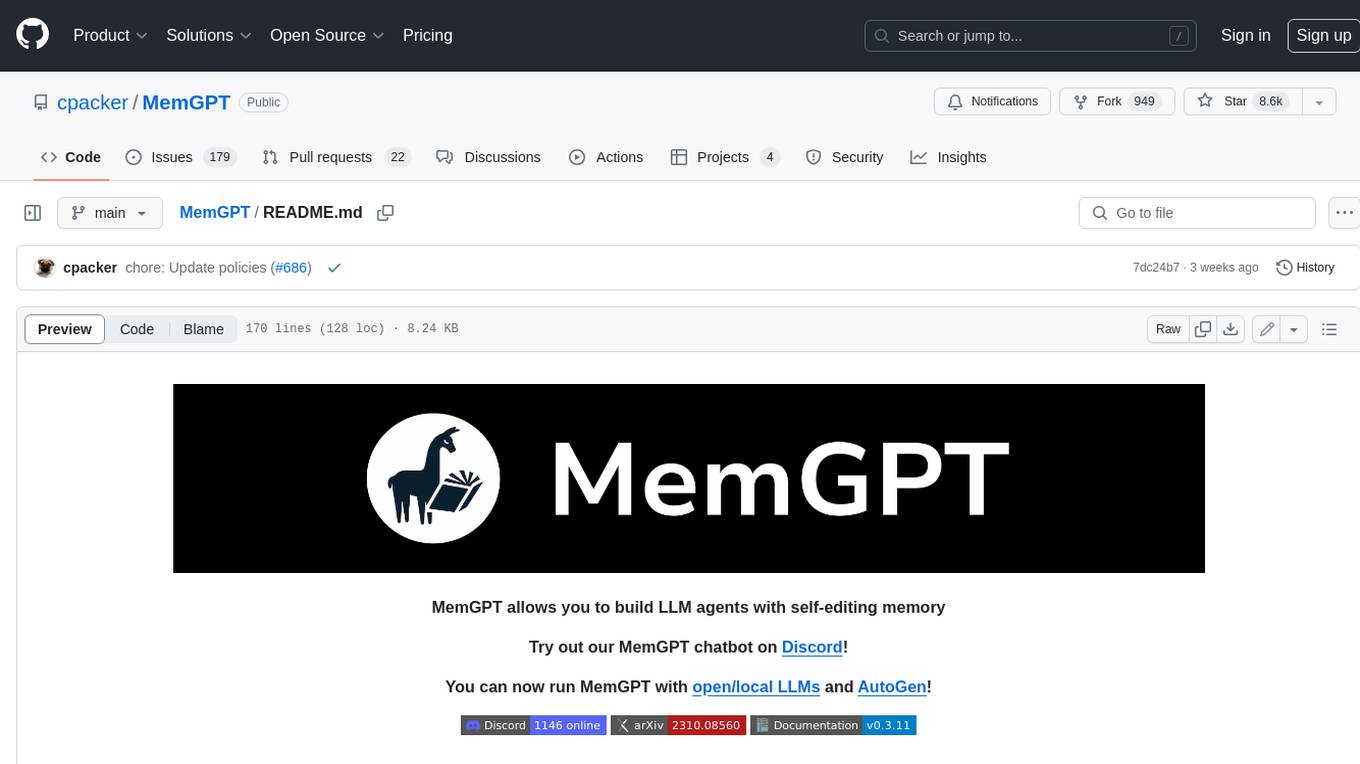
MemGPT
MemGPT is a system that intelligently manages different memory tiers in LLMs in order to effectively provide extended context within the LLM's limited context window. For example, MemGPT knows when to push critical information to a vector database and when to retrieve it later in the chat, enabling perpetual conversations. MemGPT can be used to create perpetual chatbots with self-editing memory, chat with your data by talking to your local files or SQL database, and more.
For similar jobs

sweep
Sweep is an AI junior developer that turns bugs and feature requests into code changes. It automatically handles developer experience improvements like adding type hints and improving test coverage.

teams-ai
The Teams AI Library is a software development kit (SDK) that helps developers create bots that can interact with Teams and Microsoft 365 applications. It is built on top of the Bot Framework SDK and simplifies the process of developing bots that interact with Teams' artificial intelligence capabilities. The SDK is available for JavaScript/TypeScript, .NET, and Python.

ai-guide
This guide is dedicated to Large Language Models (LLMs) that you can run on your home computer. It assumes your PC is a lower-end, non-gaming setup.

classifai
Supercharge WordPress Content Workflows and Engagement with Artificial Intelligence. Tap into leading cloud-based services like OpenAI, Microsoft Azure AI, Google Gemini and IBM Watson to augment your WordPress-powered websites. Publish content faster while improving SEO performance and increasing audience engagement. ClassifAI integrates Artificial Intelligence and Machine Learning technologies to lighten your workload and eliminate tedious tasks, giving you more time to create original content that matters.

chatbot-ui
Chatbot UI is an open-source AI chat app that allows users to create and deploy their own AI chatbots. It is easy to use and can be customized to fit any need. Chatbot UI is perfect for businesses, developers, and anyone who wants to create a chatbot.

BricksLLM
BricksLLM is a cloud native AI gateway written in Go. Currently, it provides native support for OpenAI, Anthropic, Azure OpenAI and vLLM. BricksLLM aims to provide enterprise level infrastructure that can power any LLM production use cases. Here are some use cases for BricksLLM: * Set LLM usage limits for users on different pricing tiers * Track LLM usage on a per user and per organization basis * Block or redact requests containing PIIs * Improve LLM reliability with failovers, retries and caching * Distribute API keys with rate limits and cost limits for internal development/production use cases * Distribute API keys with rate limits and cost limits for students

uAgents
uAgents is a Python library developed by Fetch.ai that allows for the creation of autonomous AI agents. These agents can perform various tasks on a schedule or take action on various events. uAgents are easy to create and manage, and they are connected to a fast-growing network of other uAgents. They are also secure, with cryptographically secured messages and wallets.

griptape
Griptape is a modular Python framework for building AI-powered applications that securely connect to your enterprise data and APIs. It offers developers the ability to maintain control and flexibility at every step. Griptape's core components include Structures (Agents, Pipelines, and Workflows), Tasks, Tools, Memory (Conversation Memory, Task Memory, and Meta Memory), Drivers (Prompt and Embedding Drivers, Vector Store Drivers, Image Generation Drivers, Image Query Drivers, SQL Drivers, Web Scraper Drivers, and Conversation Memory Drivers), Engines (Query Engines, Extraction Engines, Summary Engines, Image Generation Engines, and Image Query Engines), and additional components (Rulesets, Loaders, Artifacts, Chunkers, and Tokenizers). Griptape enables developers to create AI-powered applications with ease and efficiency.






